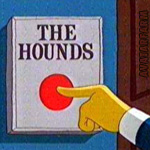 This post is about evidence loops in the OED. But let me begin at the end: In one of his Oxford lectures collected in The End of the Poem, Paul Muldoon refers back to his predecessor’s famous discussion of the word redress. Muldoon writes:
This post is about evidence loops in the OED. But let me begin at the end: In one of his Oxford lectures collected in The End of the Poem, Paul Muldoon refers back to his predecessor’s famous discussion of the word redress. Muldoon writes:
… in “The Redress of Poetry,” Seamus Heaney’s inaugural lecture as Professor of Poetry, … he riffs rather brilliantly on the various meanings of “redress,” including “to bring back (the hounds or deer) to the proper course.” Heaney continues:
In this “redress” there is no hint of ethical obligation; it is more a matter of finding a course for the breakaway of innate capacity, a course where something unhindered, yet directed, can sweep ahead into its full potential. [EP, 366]
This meaning, drawn out of hunting vocabulary, is one Heaney happened upon by serendipity, as he was tracking down the various senses of his key word in — what else? — the Oxford English Dictionary. He writes:
And this natural, heady diversion is also something induced by poetry and reminds me of a further (obsolete) meaning of ‘redress’ … which comes in entry four of the verb, subsection (b): ‘Hunting. To bring back (the hounds or deer) to the proper course.’ [RP, 20]
Heaney is being ‘reminded’ by the entry for redress, v.1 in OED2. In the newer OED3, this sense is now 5b, and it has been promoted from ‘Obs.‘ to ‘Now rare,’ apparently on the strength of a single evidence quotation. But it’s not Heaney’s! It’s Muldoon’s, from a little further down in his discussion of Heaney’s usage:
2006 P. Muldoon End of Poetry xiv. 366 Just as the hunter sometimes fails to ‘redress’ the deer or hounds, that stunt reader sometimes comes a cropper and falls off the horse.
Ignoring the error in the work title [which will soon be corrected in any case], I can see a couple of reasons why Muldoon’s sentence might be preferable as an evidence quotation – the analogical structure, for one, is explicative. But it is an interesting case of reciprocity between literary writing and the OED: a poet quotes OED; another poet quotes that poet; and OED quotes that second poet. Through this process an obsolete word regains some traction on the language [is brought back from a wayward to its proper course, can we say?]. Now if only there were some way to find occurrences like this automatically…
This reminds of Eliot’s claim that although ‘the influence of poetry … is very diffused, very indirect, and difficult to prove’ if one traces it ‘through those readers who are most affected by it, to those people who never read it at all, you will find it present everywhere’ [OPP, 22].
Granted, we are not yet at ‘everywhere’, but OED3 is a good start.
W. H. Auden boasted to me that he had got a word — “plain-sewing” in the sense of “mutual masturbation” — into the OED by using it in print for the first time; but the OED now quotes a letter from me to the TLS reporting Auden’s boast…
Another kind of “once removed” citation is the first usage of “bullshit,” for which OED quotes Lewis quoting Eliot:
c 1915 Wyndham Lewis Let. (1963) 66 Eliot has sent me Bullshit and the Ballad for Big Louise. They are excellent bits of scholarly ribaldry.
One wonders whether this will be revised in OED3 with a direct quotation from “The Triumph of Bullshit” (which doesn’t actually use the word apart from the title) in Ricks’s Inventions of the March Hare, and whether the Lewis quote will then be suppressed. Would be a shame to lose it, I think.
[I’ve now posted on this here]